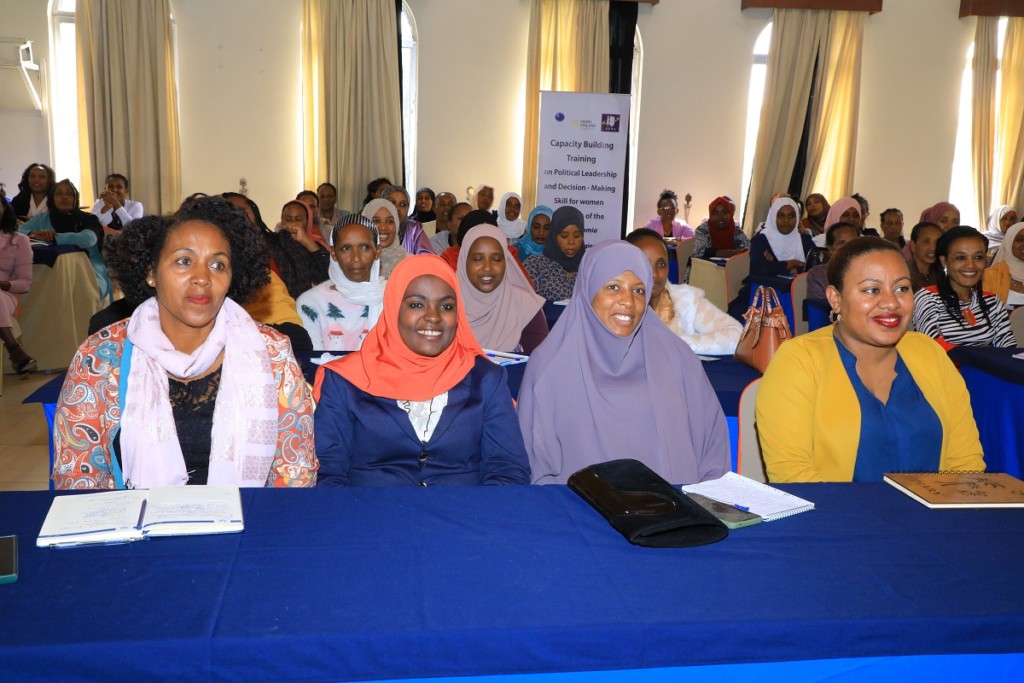
Demo Finland in Ethiopia
The co-operation started in 2019.
Partners: Network of Ethiopian Women’s Associations (NEWA) and Ethiopian Women with Disabilities National Association (EWDNA)
The programme aims to enhance the skills of elected women, women members of political parties and women with disabilities to work as members of political parties and policymakers. In addition to supporting and training women with disabilities who aim to stand as candidates in the 2026 general elections, the programme will teach politicians how to use traditional and social media to help identify and combat online violence and communicate inclusively with the media. The programme will also work with the wider political system by training electoral authorities on inclusive data management and conducting accessibility audits for political parties. Trainings for women politicians support participants in multi-party co-operation.
The previous programme, ending in 2024, trained political parties and women politicians on the status of women in Ethiopia’s patriarchal culture, the fundamentals of operating in politics, and the internal party politics that offer women the same opportunities to participate as men. Women with disabilities were trained to participate in local political activities, and electoral authorities and political parties were trained on the status of persons with disabilities and their participation in public and political life. The results listed below are from the previous programme.
Results of our work
- In 2024, 466 women with disabilities participated in various local, regional, national and international meetings/conferences concerning themes such as peace and security. In 2022, the equivalent number was 40–50, with them only taking part in local initiatives instead of national or international initiatives.
- Individual political parties have started recruiting women and persons with disabilities into the party leadership. According to the National Election Board of Ethiopia (NEBE), in 2025, 33 women held party leadership positions at the national level, while 94 held such positions at the regional level. After the first programme year in 2020, there were just two women in party leadership positions; one at the national level and one at the regional level.
- The Women’s Caucus of the Parliament and the Ethiopian Political Parties Joint Council established a network for political dialogue, connecting 23 parties in multi-party dialogue. The initiative for the network came from the organisations, but the programme supported the establishment process. This is the first time that members of the parliament and women members of political parties are working in co-operation in Ethiopia.
- The women politicians who took part in Demo Finland’s programme were consulted by NEBE in the review process of the Election Law. They advocated for minimum quotas of 20% for women in the membership and representation of political parties. These amendments are included in the bill, which is, in June 2025, pending in the Parliament.
Background on Ethiopia
Ethiopia has been a federal state since 1995. At the time, the constitution granted the country’s 12 ethnic regions broad autonomy. Abiy Ahmed, the current Prime Minister, was elected in the 2018 general election. In the early years, he implemented a number of important democratic reforms, including releasing political prisoners, lifting censorship of the media, improving transparency and accountability in governance, and concluding a peace agreement with Eritrea, which ended 20 years of conflict. However, by the start of the Tigray conflict in 2020, Abiy’s regime had gradually become authoritarian, with federal government forces committing acts of violence against civilians in the region during the conflict. Since 2023, Abiy has sought to reduce the sovereignty of the regions, which has exacerbated regional conflicts across the country.
The state of democracy has been in decline year by year, and the trend continues: In April 2025, the Parliament adopted reforms to the country’s media law that significantly reduce the media’s ability to operate. Although Ethiopia has ratified the UN conventions on the rights of women and persons with disabilities, their political participation is limited by a number of attitudinal and structural factors.
- Ranked 145/179 in V-Dem’s Liberal Democracy Index.
- Classified as an electoral autocracy* by V-Dem.
- Latest parliamentary election: 2021.
- Women in parliament: the House of People’s Representatives 42%, the House of Federation 30%.
- The UN Covenant on Civil and Political Rights was ratified in 1993.
- The UN Convention on the Rights of Women was ratified in 1981.
- The UN Convention on the Rights of Persons with Disabilities was ratified in 2010.
- More information on the state of democracy in Ethiopia: https://www.idea.int/democracytracker/country/ethiopia
*Electoral autocracy refers to a state where multi-party elections for the executive exist, but there remain insufficient levels of fundamental requisites such as freedom of expression and association, and free and fair elections.
